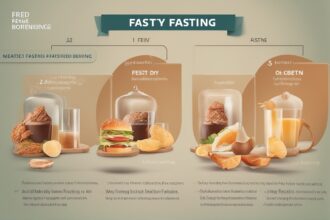Extended fasting, often defined as abstaining from food for 24 hours or more, has gained significant attention in recent years for its potential health benefits. This practice, rooted in ancient traditions and religious practices, is now being studied for its profound effects on physical and mental well-being. In this post, we’ll explore the Health Advantages of Extended Fasting, diving into the science behind why prolonged fasting might be a powerful tool for improving overall health.
What Is Extended Fasting?
Extended fasting refers to periods of intentional food abstinence that last beyond a typical overnight fast, often ranging from 24 hours to several days or even weeks under medical supervision. Unlike intermittent fasting, which involves shorter fasting windows, extended fasting pushes the body into deeper metabolic states like ketosis and autophagy. These states are believed to contribute to many of the Health Advantages of Extended Fasting, including cellular repair and improved metabolic health. While it’s not suitable for everyone, those who practice it often report transformative effects on their body and mind.
Cellular Repair and Autophagy: A Key Health Advantage
One of the most significant Health Advantages of Extended Fasting is its ability to trigger autophagy, a cellular process where the body cleans out damaged cells and regenerates new, healthier ones. During prolonged fasting, the body shifts its focus from digesting food to repairing itself at a cellular level. Studies suggest that autophagy may play a role in reducing inflammation, slowing aging, and even protecting against diseases like cancer and Alzheimer’s. By giving the digestive system a break, extended fasting allows the body to prioritize these vital repair mechanisms, leading to improved long-term health.
Weight Loss and Metabolic Benefits
Another well-documented benefit among the Health Advantages of Extended Fasting is its impact on weight loss and metabolic health. When fasting for extended periods, the body depletes its glycogen stores and begins burning fat for energy through a process called ketosis. This not only aids in weight loss but also improves insulin sensitivity, which is crucial for preventing type 2 diabetes. Many individuals who practice prolonged fasting report sustained fat loss and better control over cravings, making it a potential strategy for those struggling with obesity or metabolic syndrome. For more on how fasting impacts metabolism, check out our post on Intermittent Fasting and Metabolic Health.
Improved Mental Clarity and Focus
Beyond physical benefits, the Health Advantages of Extended Fasting extend to mental health as well. Many practitioners report heightened mental clarity and focus during prolonged fasts, often attributed to the production of ketones—a byproduct of fat burning that serves as an efficient fuel source for the brain. Additionally, fasting has been linked to increased levels of brain-derived neurotrophic factor (BDNF), a protein that supports brain health and may protect against neurodegenerative disorders. If you’re curious about fasting’s impact on the brain, explore our detailed guide on Fasting for Cognitive Function.
Cardiovascular Health and Longevity
Extended fasting may also offer significant benefits for heart health, another key component of the Health Advantages of Extended Fasting. Research indicates that prolonged fasting can lower blood pressure, reduce cholesterol levels, and decrease inflammation—all risk factors for heart disease. Furthermore, by promoting autophagy and reducing oxidative stress, fasting may contribute to increased longevity. While more human studies are needed, animal research has shown that fasting can extend lifespan, suggesting that it might help humans live healthier, longer lives. Learn more about heart health strategies in our article on Heart-Healthy Diets and Fasting.
Potential Immune System Boost
Among the lesser-known Health Advantages of Extended Fasting is its potential to rejuvenate the immune system. Studies have shown that prolonged fasting can prompt the body to recycle old immune cells and generate new ones, effectively “resetting” the immune system. This process may be particularly beneficial for individuals with autoimmune conditions or those undergoing treatments like chemotherapy, where immune function is compromised. However, it’s critical to approach extended fasting with caution and under medical guidance, especially for those with pre-existing health conditions. For additional insights on immunity, read our piece on Boosting Immunity Through Lifestyle Changes.
Disclaimer: The information provided in this post is for educational purposes only and should not be considered medical advice. Extended fasting can pose risks, including nutrient deficiencies, dehydration, and adverse effects for individuals with certain medical conditions. Always consult with a healthcare professional before beginning any fasting regimen, especially if you are pregnant, nursing, or have a chronic illness.
References
- Mattson, M. P., & Wan, R. (2005). Beneficial effects of intermittent fasting and caloric restriction on the cardiovascular and cerebrovascular systems. Journal of Nutritional Biochemistry.
- de Cabo, R., & Mattson, M. P. (2019). Effects of Intermittent Fasting on Health, Aging, and Disease. New England Journal of Medicine.
- Longo, V. D., & Mattson, M. P. (2014). Fasting: Molecular Mechanisms and Clinical Applications. Cell Metabolism.
- Cheng, C. W., et al. (2014). Prolonged Fasting Reduces IGF-1/PKA to Promote Hematopoietic-Stem-Cell-Based Regeneration and Reverse Immunosuppression. Nature Medicine.
- Harvard Health Publishing. (2018). Intermittent Fasting: Surprising Update. Harvard Medical School.
This content is for informational purposes only and not a substitute for professional advice.






